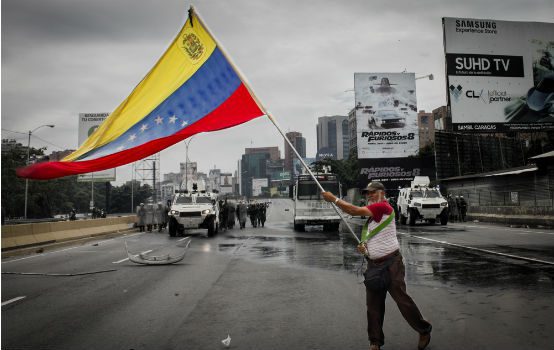The Regime Change Policy Keeps Failing in Venezuela

The AP reports on the failed coup attempt in Venezuela:
For the third time this year, the big moment in Venezuela has turned into a bust.
Trump administration officials had expected that Wednesday might turn out to be the beginning of the end for President Nicolas Maduro with senior government figures withdrawing support and the opposition launching a mass uprising with military backing.
Or at least that’s what the administration had been led to believe.
But the promised defections didn’t happen, the military uprising never materialized and Maduro still appeared to be firmly in command of the South American nation. Trump officials were back to complaining about the support Venezuela receives from Cuba and Russia while issuing vague warnings of military action [bold mine-DL].
For an administration that is trying to overthrow another government, they are awfully quick to whine about outside support for the Venezuelan government. It’s not as if Russian and Cuban support for Maduro is a secret or a surprise. Bolton’s complaints about Russian interference in a country where the U.S. is trying to depose the current leadership would almost be funny if he weren’t a top official in charge of a policy of regime change. Instead, the sheer hypocrisy of Bolton’s posturing is sickening. Considering how often the U.S. has interfered in and allied with countries on Russia’s borders, it is hard to take Bolton seriously when he says, “This is our hemisphere — it’s not where the Russians ought to be interfering.” The presumption that the U.S. is free to interfere in the internal affairs of any of our neighbors in “our hemisphere” is a throwback to the worst of our imperialist and Cold War dealings with Latin America. Public statements like this reveal the administration’s true attitudes and discredit their policy.
If the “plan” to remove Maduro failed to take Maduro’s external support into account, it was a bad plan from the start. Each of the potential “big moments” has gone bust for several reasons, but one of the main reasons is that both the opposition and the administration have assumed that everything would fall into place and that their opponents would put up no resistance. They did not anticipate how things might go wrong, and have never made contingencies for what to do if the first poorly-designed “plan” doesn’t succeed. They have assumed that the military was ready to defect en masse and just needed a signal to do so, and every time most of the military has chosen not to cooperate with their wishful thinking. Like typical interventionists, they underestimate the difficulty of achieving their goals and overrate their ability to shape and control events.
One of the curious things about the ongoing crisis in Venezuela is Maduro’s apparent reluctance to lock up his rival. It may be that Guaido has been permitted to remain free because each new failed attempt to dislodge Maduro proves how little real power Guaido has. The longer the crisis drags on without resolution, the weaker Guaido will get because he is unable to deliver on his promise to remove the current government:
“I think Maduro understands that, strategically, it’s in his interest to watch Guaido unravel on his own and be picked apart by members of his own opposition coalition,” said Geoff Ramsey, an analyst at the Washington Office on Latin America, a human-rights organization.
This is the same reason why Guaido and his outside backers have to keep trying to force the issue and make something happen, but each time that they make a hasty, ill-conceived attempt their failure makes regime change less likely.
Comments